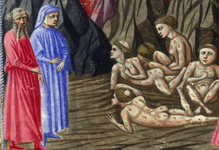
Dante, Divina Commedia
Inferno, Canto 13, 109 - 129
We were attentive still unto the trunk,
Thinking that more it yet might wish to tell us,
When by a tumult we were overtaken,
In the same way as he is who perceives
The boar and chase approaching to his stand,
Who hears the crashing of the beasts and branches;
And two behold! upon our left-hand side,
Naked and scratched, fleeing so furiously,
That of the forest, every fan they broke.
He who was in advance: "Now help, Death, help!"
And the other one, who seemed to lag too much,
Was shouting: "Lano, were not so alert
Those legs of thine at joustings of the Toppo!"
And then, perchance because his breath was failing,
He grouped himself together with a bush.
Behind them was the forest full of black
She-mastiffs, ravenous, and swift of foot
As greyhounds, who are issuing from the chain.
On him who had crouched down they set their teeth,
And him they lacerated piece by piece,
Thereafter bore away those aching members.
Inferno, Canto 19, 13 - 27
I saw upon the sides and on the bottom
The livid stone with perforations filled,
All of one size, and every one was round.
To me less ample seemed they not, nor greater
Than those that in my beautiful Saint John
Are fashioned for the place of the baptisers,
And one of which, not many years ago,
I broke for some one, who was drowning in it;
Be this a seal all men to undeceive.
Out of the mouth of each one there protruded
The feet of a transgressor, and the legs
Up to the calf, the rest within remained.
In all of them the soles were both on fire;
Wherefore the joints so violently quivered,
They would have snapped asunder withes and bands.
Dante, Divina Commedia
Purgatorio, Canto 31, 16 - 36
Even as a cross-bow breaks, when 'tis discharged
Too tensely drawn the bowstring and the bow,
And with less force the arrow hits the mark,
So I gave way beneath that heavy burden,
Outpouring in a torrent tears and sighs,
And the voice flagged upon its passage forth.
Whence she to me: "In those desires of mine
Which led thee to the loving of that good,
Beyond which there is nothing to aspire to,
What trenches lying traverse or what chains
Didst thou discover, that of passing onward
Thou shouldst have thus despoiled thee of the hope?
And what allurements or what vantages
Upon the forehead of the others showed,
That thou shouldst turn thy footsteps unto them?"
After the heaving of a bitter sigh,
Hardly had I the voice to make response,
And with fatigue my lips did fashion it.
Weeping I said: "The things that present were
With their false pleasure turned aside my steps,
Soon as your countenance concealed itself."
Inferno, Canto 2, 70 - 85
Beatrice am I, who do bid thee go;
I come from there, where I would fain return;
Love moved me, which compelleth me to speak.
When I shall be in presence of my Lord,
Full often will I praise thee unto him.'
Then paused she, and thereafter I began:
'O Lady of virtue, thou alone through whom
The human race exceedeth all contained
Within the heaven that has the lesser circles,
So grateful unto me is thy commandment,
To obey, if 'twere already done, were late
No farther need'st thou ope to me thy wish.
But the cause tell me why thou dost not shun
The here descending down into this centre,
From the vast place thou burnest to return to.
Inferno, Canto 5, 112 - 138
When I made answer, I began: "Alas!
How many pleasant thoughts, how much desire,
Conducted these unto the dolorous pass!"
Then unto them I turned me, and I spake,
And I began: "Thine agonies, Francesca,
Sad and compassionate to weeping make me.
But tell me, at the time of those sweet sighs,
By what and in what manner Love conceded,
That you should know your dubious desires?"
And she to me: "There is no greater sorrow
Than to be mindful of the happy time
In misery, and that thy Teacher knows.
But, if to recognise the earliest root
Of love in us thou hast so great desire,
I will do even as he who weeps and speaks.
One day we reading were for our delight
Of Launcelot, how Love did him enthral.
Alone we were and without any fear.
Full many a time our eyes together drew
That reading, and drove the colour from our faces;
But one point only was it that o'ercame us.
When as we read of the much-longed-for smile
Being by such a noble lover kissed,
This one, who ne'er from me shall be divided,
Kissed me upon the mouth all palpitating.
Galeotto was the book and he who wrote it.
That day no farther did we read therein."

#32010336
Dante,Virgil and the plague-stricken. From Dante's Divina Comm...

#32010337
Dante and Virgil in the underworld(detail),with a commentary by Guinforte...

#32010338
Dante and Virgil in the underworld(detail),with a commentary by Guinforte...

#32010547
Dante and Beatrice,around 1300-1321. The couple fly through the heavens towards...

#32010548
Dante and Beatrice in the Heaven of the Moon, around 1350-1360. Beatrice points...

#32010645
Dante and Virgil in the tenth canto, first half 15th. The two poets, shown twice...

#32010646
Dante and Apollo, first half 15th.On the left Dante,dressed in blue, kneels in a...

#32010647
Heaven of the moon, first half 15th. On the left the soul returns to her star,ac...

#39170162
Paolo and Francesca da Rimini 1855 Throughout his life Rossetti was fascinate...

#39170163
Beata Beatrix circa 1864-70 Rossetti’s inspiration for this painting was the...

#39170165
Dante's Dream at the Time of the Death of Beatrice 1856 Watercolour on pape...

#40030514
Dante Alighieri (1265-1321), poet From a series of 28 por...